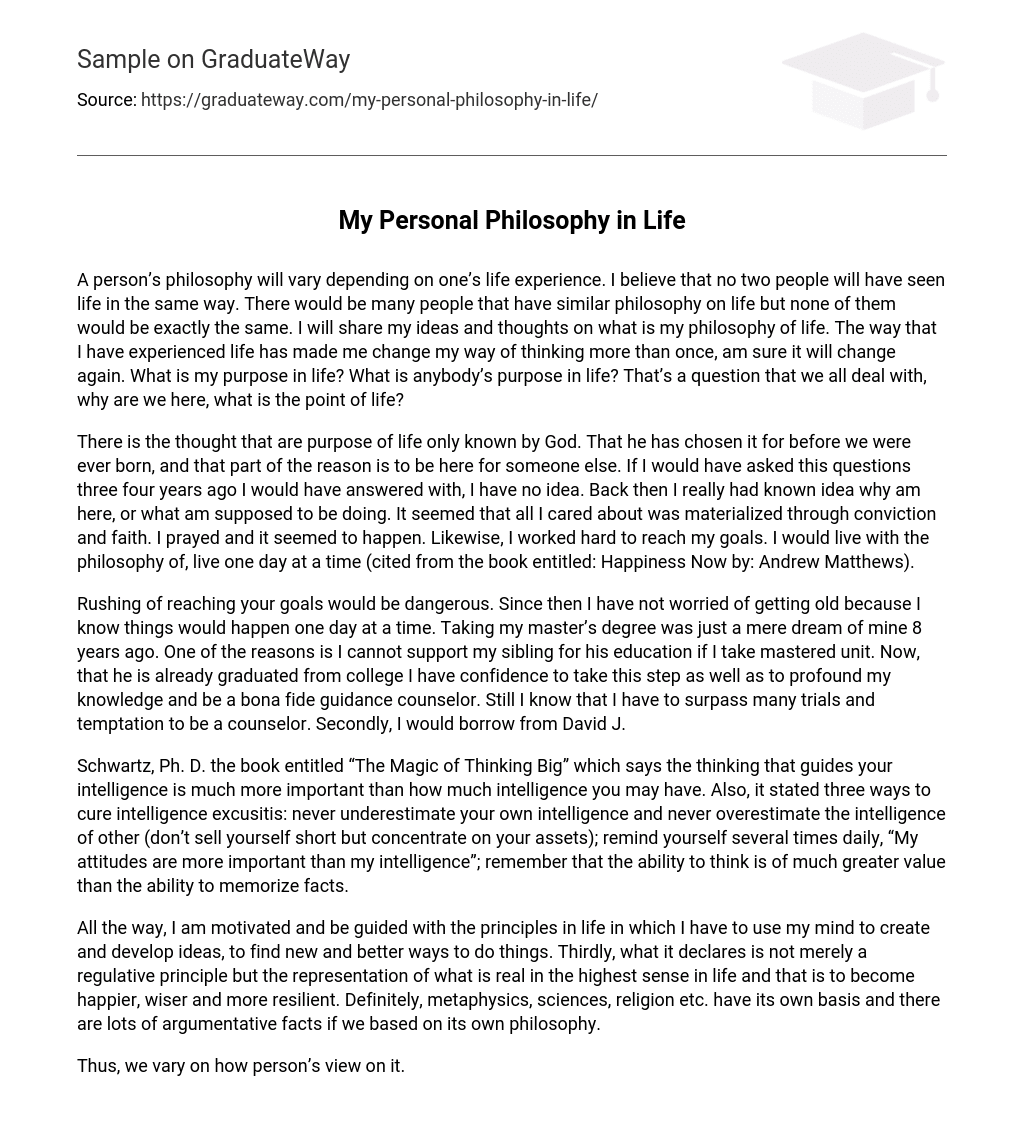Each person has a unique philosophy of life shaped by their individual experiences, although some may have similar beliefs. This passage delves into my personal philosophy, which has been formed through my own encounters. Throughout time, I have experienced several transformative events that have influenced my thinking, and I expect this evolution to continue. Reflecting on the purpose of existence and the meaning of life is a universal pursuit.
The belief is that God knows the purpose of life. It is believed that God has already chosen our purpose before we were born, and part of that purpose is to be here for someone else. If I had asked this question three or four years ago, my answer would have been I don’t know. At that time, I really didn’t know why I am here or what I am supposed to be doing.
Through conviction and faith, all my concerns seemed to become real. I prayed and it seemed to come true. Similarly, I worked hard to achieve my goals.
I followed the philosophy of living one day at a time (cited from the book entitled: Happiness Now by Andrew Matthews).
Despite the risks of rushing towards goals, I have gained a valuable lesson in not fretting about getting older and instead concentrating on living day by day. Back then, acquiring my master’s degree seemed like an unattainable aspiration due to the financial burden of supporting my sibling’s education while pursuing it. Nevertheless, now that my sibling has completed college, I feel self-assured in striving for this objective and expanding my expertise to become a competent guidance counselor. I am aware that there will still be numerous obstacles and temptations throughout this journey. Furthermore, I draw inspiration from David J.
In his book “The Magic of Thinking Big,” Schwartz, Ph. D. highlights the importance of one’s thinking in determining intelligence instead of merely possessing a high level of intelligence. The book offers three methods to overcome intelligence excusitis: recognizing and focusing on your strengths rather than overestimating others’ intelligence, consistently reminding oneself that attitudes hold greater significance than intelligence, and acknowledging the value of thinking skills over memorizing facts.
Throughout my life, I am consistently driven and directed by principles that revolve around using my intellect to generate concepts, enhance them, and discover more efficient approaches for accomplishing tasks. These principles are not mere regulations; they embody the essential truth in life, which ultimately results in greater happiness, wisdom, and resilience. It is vital to recognize that metaphysics, sciences, religion, etc., all possess their own foundations and there exist numerous debates stemming from their respective philosophies.
While people may hold varying perspectives on the matter, it is crucial to acknowledge the significant contributions of both ancient and modern philosophers in inspiring individuals. Socrates, with his renowned quote “All I know is nothing,” has had a profound effect on me by highlighting the significance of humility and receptiveness to ideas. Plato, another influential philosopher, proclaimed more than two millennia ago that knowledge is justified true belief—an idea that continues to greatly influence educational theories.
Since then, modern thinkers have continuously sought knowledge about human psychology, development, and education. Among these thinkers is John Dewey, an American philosopher, psychologist, and educational reformer. Dewey was a supporter of Educational Progressivism, which argues that education involves the individual’s participation in the social and psychological aspects that shape their instincts. Additionally, Dewey believed that one cannot acquire knowledge without motivation.
My life philosophy revolves around embracing and integrating various layers of meaning and experience, rather than limiting human potential. Taking a holistic approach is essential to achieving success. It is important to remember that if someone says “No,” it should not be taken personally; seeking help from another person can often lead to positive outcomes.
References: Happiness Now by Andrew Matthews (Copyright 2005 Seashell Publishers), The Magic of Thinking Big by David J. Schwartz, Ph.D., Holistic Education on Wikipedia, and 10 Modern Philosophers and their Contribution to Education.





